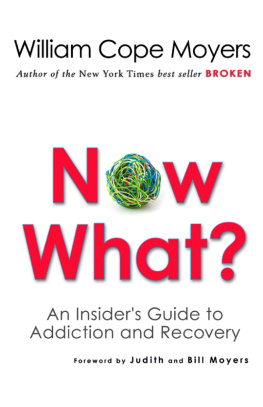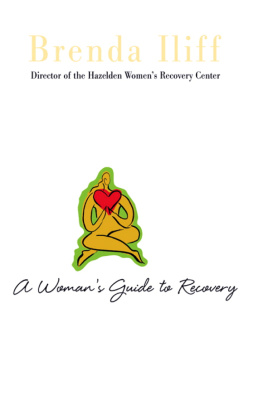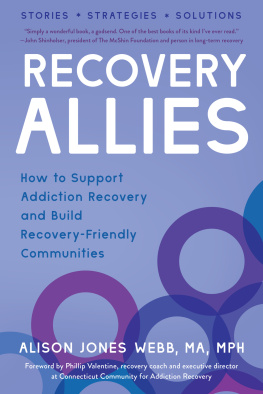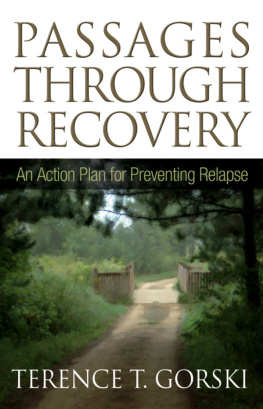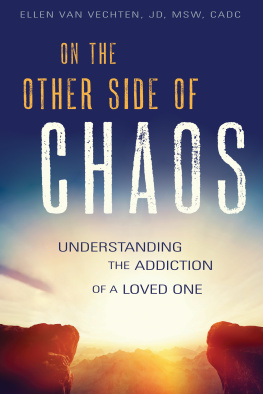

Hazelden Publishing
Center City, Minnesota 55012
800-328-9000
hazelden.org/bookstore
2014 by Debra Jay
All rights reserved. Published 2014
No part of this publication, either print or electronic, may be reproduced in any form or by any means without the express written permission of the publisher. Failure to comply with these terms may expose you to legal action and damages for copyright infringement.
ISBN: 978-1-61649-562-6 ebook
Library of Congress Cataloging-in-Publication Data is on file with the Library of Congress.
Structured Family Recovery is a trademark of Debra Jay. Having proprietary rights makes it possible to protect its integrity and professionalism.
Editors notes
The names, details, and circumstances may have been changed to protect the privacy of those mentioned in this publication.
This publication is not intended as a substitute for the advice of health care professionals.
Alcoholics Anonymous, AA, and the Big Book are registered trademarks of Alcoholics Anonymous World Services, Inc.
18 17 16 15 14 1 2 3 4 5 6
Developmental editor: Sid Farrar
Production editor: Mindy Keskinen
Cover design by Kathi Dunn, Dunn + Associates
Interior design by Terri Kinne
Typesetting by Bookmobile Design & Digital Publisher Services
To Sara Critton Jay
who saved her son
by intervening on his addiction,
making it possible for me
to meet him and marry him
ten years later.
Thank you with all my heart.
A fine glass vase goes from treasure to trash the moment it is broken. Fortunately, something else happens to you and me. Pick up your pieces. Then, help me gather mine.
VERA NAZARIAN, novelist
How can I know who I am until I see what I do? How can I know what I value until I see where I walk?
KARL WEICK, psychologist and author
Contents
The name Structured Family Recovery is a trademark of Debra Jay.
Houston, we have a problem!
The problem presented in this impressive new book is not out in space, it is close to home. Today the expected outcome of addiction treatment is relapse. In fact, relapse is so common that it is a central element in the definition of addiction.
Of course relapse is common with many health problems: asthma, for example, or heart attacks. But addiction is different, because there is a way to manage this common disorder that reliably produces long-term recovery, not relapse. Over the past decade my colleagues and I conducted the first national study of this system of care management, the state Physician Health Programs. Begun four decades ago, these programs were pioneered by physicians, many of whom were themselves in recovery from addiction. The core strategy to these diverse programs holds the promise of greatly improving outcomes for addicts and their families. This strategy is called the New Paradigm.
In this book, Debra Jay unlocks the secrets of this revolutionary approach to addiction. She adds a significant new dimension by focusing on the role of the family both in creating this system of care management and in making it work, long term. The author highlights an essential element of the approach as no one else has: the crucial role of the addicts family in this terribly painful family disease. She makes clear that the family has a role in the addiction, but then she carries this analysis to an entirely new level, showing that the family is a major beneficiary of the miracle of recovery and has the power to create a recovery milieu that serves as a powerful shield against relapse. Recovery is not just about the addict. It is accomplished with a team built around the family, others closest to the addicted person, and the greater recovering community.
This new approach, which she calls Structured Family Recovery, has transformed the power of the New Paradigm for recovery used by commercial pilots, attorneys, and health professionals, bringing it into our homes and families. Structured Family Recovery provides a first-of-its-kind road map and, with it, good reason to expect success.
The key to this new approach is the long-term management of care, starting with an intervention to deliver the addict into treatment and recovery. The special role of addiction treatment is to help the addict understand what is wrongthe disease concept of addictionand what to do about it. That path leads to recovery: Go to meetings, work the program, and dont use alcohol or other drugs of abuse. After treatment, this approach monitors for relapse to any substance use, meeting any relapse with swift, certain, and serious consequences.
Successful recovery produces positive consequences as the result of adherence to the program. In addition, this approach manages overall compliance with the recovery plan, including daily or near-daily Twelve Step meetings. While treatment is a crucial part of this process for most addicts, the magic is not in the treatment; it is in the Twelve Step programs of Alcoholics Anonymous, Narcotics Anonymous, and Al-Anon. These entirely free and ubiquitous fellowships are everywhere in the United States. They are spreading rapidly around the world. I have many reasons to be proud of the United States, but one of the things I am most grateful for and proud of is the creation of these unique fellowships beginning in Akron, Ohio, in 1935.
How did Debra Jay come to this important new understanding? In addition to working with alcoholics, addicts, and their families for nearly twenty-five years, she is a child of such a family. Every day she lives the lessons and the rewards of her familys own struggle to survive this often fatal and relapsing disease. Addiction is a teacher, often a cruel, even pitiless teacher. The lessons to be learned by the family in the crucible of addiction are as precious as they are hard-won.
So fasten your seat belts for a space-age journey out of the chemical slavery of addiction, a journey that makes recovery, not relapse, the expected outcome of addiction treatment.
Robert L. DuPont, MD
President, Institute for Behavior and Health, Inc. First Director of the National Institute on Drug Abuse
This book is a product of the gift of working with families of alcoholics and addicts for over two decades. They reliably show tremendous love and perseverance in the face of a disease that ruthlessly changes their addicted loved ones, sometimes beyond recognition. To each of those families, thank you. You taught me much about our higher selves and have given me cause for ongoing hope.
Jane Dystel, my agent at Dystel & Goderich Literary Management, is my guiding light who readily gives of her depth of knowledge, steadiness of purpose, and great wisdom. But more importantly, everything she does is ultimately informed by her unwavering integrity and heart.
I thank Sid Farrar, my editor at Hazelden Publishing, who made this book possible by seeing the importance of the vision. It is a better book by his urging to write it for families who choose either to work with a professional or to proceed without one. He did much to improve this book in innumerable ways. For first-rate copyediting, a big thanks to Monica Frischkorn, and thanks to Mindy Keskinen for her excellent work as production editor.
Next page

